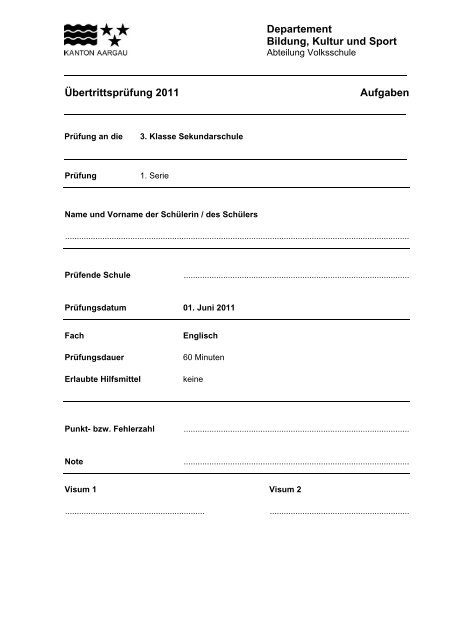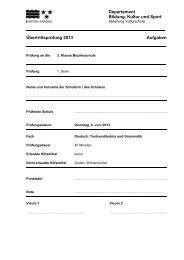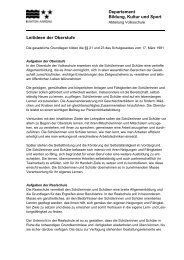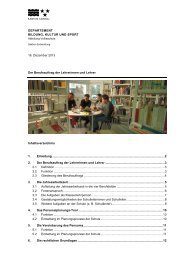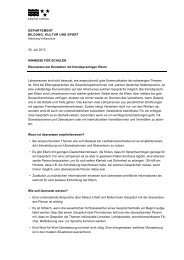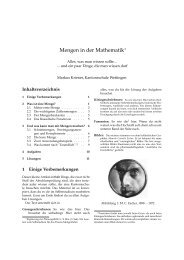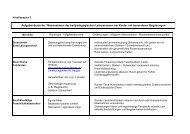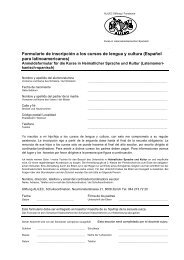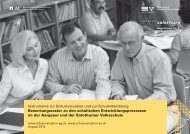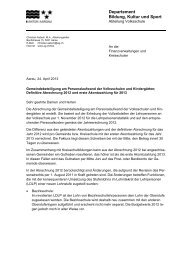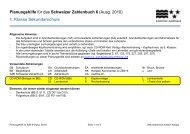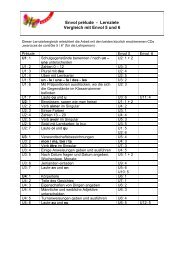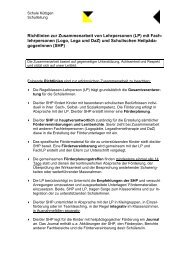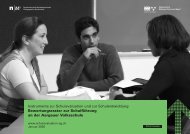Übertrittsprüfung 2011 Englisch
Übertrittsprüfung 2011 Englisch
Übertrittsprüfung 2011 Englisch
Create successful ePaper yourself
Turn your PDF publications into a flip-book with our unique Google optimized e-Paper software.
Departement<br />
Bildung, Kultur und Sport<br />
Abteilung Volksschule<br />
Übertrittsprüfung <strong>2011</strong><br />
Aufgaben<br />
Prüfung an die<br />
3. Klasse Sekundarschule<br />
Prüfung<br />
1. Serie<br />
Name und Vorname der Schülerin / des Schülers<br />
....................................................................................................................................................<br />
Prüfende Schule .................................................................................................<br />
Prüfungsdatum 01. Juni <strong>2011</strong><br />
Fach<br />
Prüfungsdauer<br />
Erlaubte Hilfsmittel<br />
<strong>Englisch</strong><br />
60 Minuten<br />
keine<br />
Punkt- bzw. Fehlerzahl .................................................................................................<br />
Note .................................................................................................<br />
Visum 1 Visum 2<br />
............................................................ ............................................................
<strong>Englisch</strong> / 3. Klasse Sekundarschule<br />
1. Serie<br />
1. Listening comprehension<br />
Die anwesende Lehrperson wird dir einen kurzen Text vorlesen. Danach wirst du Zeit haben,<br />
die Fragen und Antworten durchzugehen. Anschliessend wird dir der Text noch einmal<br />
vorgelesen.<br />
in London,<br />
in London.<br />
Tom lives in in Reading, but his parents live in in Reading.<br />
in Manchester,<br />
in Manchester.<br />
in a hospital,<br />
in a hospital.<br />
His mother works in a bank, but his father works in a bank.<br />
in a hotel,<br />
in a hotel.<br />
in a hospital,<br />
Tom would like to work in a bank,<br />
in a hotel,<br />
in a hospital.<br />
but he works in a bank.<br />
in a hotel.<br />
Russian,<br />
Spanish.<br />
Tom speaks German, but he doesn’t speak French.<br />
Spanish,<br />
Italian.<br />
His e-mail address is<br />
tom7905@nonstop.uk.<br />
tom7095@nonstop.uk.<br />
tom7950@nonstop.uk.<br />
He would like to come to Switzerland<br />
but it’s too expensive.<br />
and the fare is no problem for him.<br />
because it’s not expensive.<br />
Pro richtige Antwort 1 Punkt<br />
Total 10 Punkte<br />
2. Complete the sentences with a, an or the.<br />
Vervollständige die Sätze mit a, an oder the.<br />
Example: Do you have ___a____ television at home?<br />
London is _____ capital of England. It’s ___ very big city.<br />
My sister isn’t __ English teacher. She is ___ French teacher.<br />
What’s ____ name of this song? I think, it’s ___ nice song, but my father<br />
thinks, it’s ___ awful song.<br />
Aufgaben 2/7
<strong>Englisch</strong> / 3. Klasse Sekundarschule<br />
1. Serie<br />
Do you always use ___ dictionary in school?<br />
I never eat ___ apple for dinner, but I always eat ___ orange for dinner.<br />
Pro richtige Form ½ Punkt<br />
(Rechtschreibung zählt)<br />
Total 5 Punkte<br />
3. Verben - Verbs<br />
Fill in the gaps. Fülle die Lücken aus.<br />
Example: eat We __eat___ a lot of bread in the morning.<br />
work<br />
He ________ as a teacher.<br />
fly She never _________ .<br />
do<br />
go<br />
can<br />
sit<br />
do<br />
can<br />
go<br />
be<br />
come<br />
work<br />
finish<br />
Have<br />
I always ____ my homework in school.<br />
Does he usually ____ to work by train?<br />
No, she ________ speak French, it’s too difficult for her.<br />
Yes, he always ______ on the same chair.<br />
My brother? No, he never _______ his homework in school.<br />
They _______ speak Italian, they are Italian.<br />
His sister never _______ to the cinema.<br />
We ________ French, we live in Paris.<br />
Where does he _______ from?<br />
No, they don’t ______ there.<br />
She never _________ work before two o’clock.<br />
My father ______ got a blue car.<br />
Pro richtige Form ½ Punkt<br />
Total 7 Punkte<br />
(Rechtschreibung zählt)<br />
Aufgaben 3/7
<strong>Englisch</strong> / 3. Klasse Sekundarschule<br />
1. Serie<br />
4. Singular and Plural<br />
a pot of tea two _______________ a lady ten ______________<br />
a man three ______________ an address five ______________<br />
a curtain many ______________ a dictionary six _______________<br />
a watch four _______________ a child many _____________<br />
a woman seven ______________ a glass many _____________<br />
Pro richtige Antwort ½ Punkt<br />
(Rechtschreibung zählt)<br />
Total 5 Punkte<br />
5. What’s the opposite?<br />
Was ist das Gegenteil?<br />
Example: long __short__<br />
buy __________________ teach ___________________<br />
carelessly __________________ warm ___________________<br />
start<br />
__________________ expensive ___________________<br />
poor __________________ badly ___________________<br />
always __________________ easy ___________________<br />
Pro richtige Antwort ½ Punkt<br />
(Rechtschreibung zählt)<br />
Total 5 Punkte<br />
6. Present continuous or simple present?<br />
Write sentences using the correct time. Bilde Sätze in der richtigen Form.<br />
Example:<br />
He __speaks__ English and Italian. (speak)<br />
Not now! I ___________________ my homework. (do)<br />
Open the door! I ___________________ a shower. (have)<br />
It’s a lovely day today – the sun ___________________ . (shine)<br />
Aufgaben 4/7
<strong>Englisch</strong> / 3. Klasse Sekundarschule<br />
1. Serie<br />
My mother usually ______________________ (drink) mineral water, but today<br />
she ________________________ (drink) tea.<br />
Peter never ________________________ (read) a book.<br />
Pro richtige Antwort 1 Punkt<br />
(Rechtschreibung zählt)<br />
Total 6 Punkte<br />
7. Write these words in the correct order to make sentences.<br />
Ordne die Sätze neu, um richtige Sätze zu erstellen.<br />
Example: her/ name/ what’s/ father’s/ ? _What’s her father’s name_ ?<br />
in / meat / parents / eat / the / never / my / evening / .<br />
______________________________________________________________<br />
do / usually / what / on / you / morning / Sunday / do / ?<br />
______________________________________________________________<br />
morning / church / go / usually / Sunday / we / to / on / .<br />
______________________________________________________________<br />
disco / I / the / never / at / see / them / .<br />
______________________________________________________________<br />
old / years / thirty-four / is / he / .<br />
______________________________________________________________<br />
Pro richtige Antwort 1 Punkt<br />
(Rechtschreibung zählt)<br />
Total 5 Punkte<br />
Aufgaben 5/7
<strong>Englisch</strong> / 3. Klasse Sekundarschule<br />
1. Serie<br />
8. What are the questions to the following answers?<br />
Was sind die Fragen zu den folgenden Antworten?<br />
Example:<br />
__Can I come in?___ / Yes, you can come in.<br />
___________________ drinking ? / He’s drinking a coke.<br />
___________________ their books? / They are at school.<br />
___________________ your name? / My name is William.<br />
___________________ Kate? / She’s his wife.<br />
___________________ a house? / No, they haven’t.<br />
___________________ the fare? / It’s £5.<br />
___________________ go to? / I go to London.<br />
Pro richtige Antwort 1 Punkt<br />
(Rechtschreibung zählt)<br />
Total 7 Punkte<br />
10. Reading comprehension<br />
Lucy and Emily are two sisters from Frimley Green who work in St. Thomas<br />
Hospital in London. They usually go to work by train, but sometimes they use<br />
their father’s car to get there. They never use their mother’s car.<br />
Their father works as a receptionist at a hotel near Heathrow Airport. He often<br />
works on Saturday and Sunday, Lucy and Emily too. That’s why their mother,<br />
who works as a teacher in Basingstoke, is sometimes alone on the weekend.<br />
For lunch, Lucy and Emily often go to Piccadilly Circus, a place in the center of<br />
London, to eat their sandwiches. They can’t always go there, because they<br />
sometimes don’t have enough (genug) time to go there.<br />
They like movies very much and they would like to go to the cinema in London,<br />
but it is too expensive for them.<br />
Aufgaben 6/7
<strong>Englisch</strong> / 3. Klasse Sekundarschule<br />
1. Serie<br />
True, false, don’t know:<br />
True False Don’t know<br />
Lucy doesn’t know Emily. <br />
Emily lives in London. <br />
Lucy and Emily have got a car. <br />
Their mother has got a car. <br />
Their father works at Heathrow Airport. <br />
Lucy and Emily never work on Saturdays. <br />
Lucy and Emily always eat their Lunch at<br />
Picadilly Circus. <br />
Their mother is sometimes alone on the<br />
weekend, because she is a teacher. <br />
Their mother lives in Basingstoke. <br />
Lucy and Emily often go the cinema in<br />
London. <br />
Pro richtige Antwort 1 Punkt<br />
Total 10 Punkte<br />
Aufgaben 7/7
<strong>Englisch</strong> Aufnahmeprüfung <strong>2011</strong><br />
Sekundarschule 3. Klasse<br />
Der vorliegende Text wird den Schülern zunächst einmal langsam<br />
vorgesprochen (bitte kurzen Halt nach jedem Block). Danach haben die Schüler<br />
Zeit, ihre Antworten einzusetzen. Anschliessend wird der Text noch einmal<br />
langsam vorgesprochen (bitte wieder mit kurzen Stopps nach jedem Block).<br />
Text listening comprehension<br />
Tom is a young British Man and a supporter of Manchester United. No, he doesn’t<br />
live in London but his parents live there. Tom lives in a city near London called<br />
Reading.<br />
His mother works in a bank near a big hospital where his father works. Tom works in<br />
a bank, but he would like to work in a hotel because he likes to speak different<br />
languages. He doesn’t speak Russian and Spanish, but he speaks German, French<br />
and Italian very well.<br />
He would like to travel to Switzerland. He knows, that Switzerland is very expensive,<br />
but he has got a lot of money to spend.<br />
You would like to write to Tom? Well, his e-mail address is tom7095@nonstop.uk.<br />
Text Listening Comprehension<br />
<strong>Englisch</strong> Aufnahmeprüfung 3. Sek. <strong>2011</strong> 1. Serie
Departement<br />
Bildung, Kultur und Sport<br />
Abteilung Volksschule<br />
Übertrittsprüfung <strong>2011</strong><br />
Lösungen<br />
Prüfung an die<br />
3. Klasse Sekundarschule<br />
Prüfung<br />
1. Serie<br />
Fach<br />
Prüfungsdauer<br />
<strong>Englisch</strong><br />
60 Minuten<br />
Erlaubte Hilfsmittel<br />
keine
<strong>Englisch</strong> / 3. Klasse Sekundarschule<br />
1. Serie<br />
1. Listening comprehension<br />
Die anwesende Lehrperson wird dir einen kurzen Text vorlesen. Danach wirst du Zeit haben,<br />
die Fragen und Antworten durchzugehen. Anschliessend wird dir der Text noch einmal<br />
vorgelesen.<br />
in London,<br />
X in London.<br />
Tom lives in X in Reading, but his parents live in in Reading.<br />
in Manchester,<br />
in Manchester.<br />
in a hospital,<br />
X in a hospital.<br />
His mother works X in a bank, but his father works in a bank.<br />
in a hotel,<br />
in a hotel.<br />
in a hospital,<br />
Tom would like to work in a bank,<br />
X in a hotel,<br />
in a hospital.<br />
but he works X in a bank.<br />
in a hotel.<br />
Russian,<br />
X Spanish.<br />
Tom speaks X German, but he doesn’t speak French.<br />
Spanish,<br />
Italian.<br />
His e-mail address is<br />
tom7905@nonstop.uk.<br />
X tom7095@nonstop.uk.<br />
tom7950@nonstop.uk.<br />
He would like to come to Switzerland<br />
but it’s too expensive.<br />
X and the fare is no problem for him.<br />
because it’s not expensive.<br />
Pro richtige Antwort 1 Punkt<br />
Total 10 Punkte<br />
2. Complete the sentences with a, an or the.<br />
Vervollständige die Sätze mit a, an oder the.<br />
Example: Do you have ___a____ television at home?<br />
London is _the_ capital of England. It’s _a_ very big city.<br />
My sister isn’t _an_ English teacher. She is _a_ French teacher.<br />
What’s _the_ name of this song? I think, it’s _a_ nice song, but my father<br />
thinks, it’s _an_ awful song.<br />
Lösungen 2/7
<strong>Englisch</strong> / 3. Klasse Sekundarschule<br />
1. Serie<br />
Do you always use _a__ dictionary in school?<br />
I never eat _an__ apple for dinner, but I always eat _an__ orange for dinner.<br />
Pro richtige Form ½ Punkt<br />
(Rechtschreibung zählt)<br />
Total 5 Punkte<br />
3. Verben - Verbs<br />
Fill in the gaps. Fülle die Lücken aus.<br />
Example: eat We __eat___ a lot of bread in the morning.<br />
work<br />
He _works____ as a teacher.<br />
fly She never _flies________ .<br />
do<br />
go<br />
can<br />
sit<br />
do<br />
can<br />
go<br />
be<br />
come<br />
work<br />
finish<br />
have<br />
I always _do__ my homework in school.<br />
Does he usually _go_ to work by train?<br />
No, she _can’t___ speak French, it’s too difficult for her.<br />
Yes, he always _sits___ on the same chair.<br />
My brother? No, he never __does_____ his homework in school.<br />
They _can__ speak Italian, they are Italian.<br />
His sister never __goes__ to the cinema.<br />
We __are___ French, we live in Paris.<br />
Where does he _come__ from?<br />
No, they don’t _work_ there.<br />
She never __finishes__ work before two o’clock.<br />
My father _has__ got a blue car.<br />
Pro richtige Form ½ Punkt<br />
(Rechtschreibung zählt)<br />
Total 7 Punkte<br />
Lösungen 3/7
<strong>Englisch</strong> / 3. Klasse Sekundarschule<br />
1. Serie<br />
4. Singular and Plural<br />
a pot of tea two _pots of tea______ a lady ten __ladies_______<br />
a man three __men_________ an address five __addresses___<br />
a curtain many __curtains______ a dictionary six __dictionaries__<br />
a watch four ___watches_____ a child many _children _____<br />
a woman seven __women______ a glass many _glasses _____<br />
Pro richtige Antwort ½ Punkt<br />
(Rechtschreibung zählt)<br />
Total 5 Punkte<br />
5. What’s the opposite?<br />
Was ist das Gegenteil?<br />
Example: long __short__<br />
buy ____sell____________ teach ____learn___________<br />
carelessly ____carefully________ warm ____cold____________<br />
start ____end / finish______ expensive ____cheap__________<br />
poor ____rich____________ badly ____well____________<br />
always ____never__________ easy ____difficult ________<br />
Pro richtige Antwort ½ Punkt<br />
(Rechtschreibung zählt)<br />
Total 5 Punkte<br />
6. Present continuous or simple present?<br />
Write sentences using the correct time. Bilde Sätze in der richtigen Form.<br />
Example:<br />
He __speaks__ English and Italian. (speak)<br />
Not now! I ___’m (am) doing______ my homework. (do)<br />
Open the door! I __’m (am) having_____ a shower. (have)<br />
It’s a lovely day today – the sun __’s (is) shining__________ . (shine)<br />
Lösungen 4/7
<strong>Englisch</strong> / 3. Klasse Sekundarschule<br />
1. Serie<br />
My mother usually ___drinks_________ (drink) mineral water, but today she<br />
___ ‘s (is) drinking___________ (drink) tea.<br />
Peter never __reads________ (read) a book.<br />
Pro richtige Antwort 1 Punkt<br />
(Rechtschreibung zählt)<br />
Total 6 Punkte<br />
7. Write these words in the correct order to make sentences.<br />
Ordne die Sätze neu, um richtige Sätze zu erstellen.<br />
Example: her/ name/ what’s/ father’s/ ? _What’s her father’s name_ ?<br />
in / meat / parents / eat / the / never / my / evening / .<br />
_My parents never eat meat in the evening ._________________________<br />
do / usually / what / on / you / morning / Sunday / do / ?<br />
_What do you usually do on Sunday morning?_______________________<br />
morning / church / go / usually / Sunday / we / to / on / .<br />
_We usually go to church on Sunday morning._______________________<br />
disco / I / the / never / at / see / them / .<br />
_I never see them at the disco.____________________________________<br />
old / years / thirty-four / is / he / .<br />
_He is thirty-four years old._______________________________________<br />
Pro richtige Antwort 1 Punkt<br />
(Rechtschreibung zählt)<br />
Total 5 Punkte<br />
Lösungen 5/7
<strong>Englisch</strong> / 3. Klasse Sekundarschule<br />
1. Serie<br />
8. What are the questions to the following answers?<br />
Was sind die Fragen zu den folgenden Antworten?<br />
Example:<br />
__Can I come in?___ / Yes, you can come in.<br />
__What is he______ drinking ? / He’s drinking a coke.<br />
__Where are ______ their books? / They are at school.<br />
__What’s ________ your name? / My name is William.<br />
__Who’s (is)______ Kate? / She’s his wife.<br />
__Have they got (Do they have)_ a house? / No, they haven’t.<br />
__How much is____ the fare? / It’s £5.<br />
__Where do you___ go to? / I go to London.<br />
Pro richtige Antwort 1 Punkt<br />
(Rechtschreibung zählt)<br />
Total 7 Punkte<br />
9. Reading comprehension<br />
Lucy and Emily are two sisters from Frimley Green who work in St. Thomas<br />
Hospital in London. They usually go to work by train, but sometimes they use<br />
their father’s car to get there. They never use their mother’s car.<br />
Their father works as a receptionist at a hotel near Heathrow Airport. He often<br />
works on Saturday and Sunday, Lucy and Emily too. That’s why their mother,<br />
who works as a teacher in Basingstoke, is sometimes alone on the weekend.<br />
For lunch, Lucy and Emily often go to Piccadilly Circus, a place in the center of<br />
London, to eat their sandwiches. They can’t always go there, because they<br />
sometimes don’t have enough (genug) time to go there.<br />
They like movies very much and they would like to go to the cinema in London,<br />
but it is too expensive for them.<br />
Lösungen 6/7
<strong>Englisch</strong> / 3. Klasse Sekundarschule<br />
1. Serie<br />
True, false, don’t know:<br />
True False Don’t know<br />
Lucy doesn’t know Emily. X <br />
Emily lives in London. X <br />
Lucy and Emily have got a car. X<br />
Their mother has got a car. X <br />
Their father works at Heathrow Airport. X <br />
Lucy and Emily never work on Saturdays. X <br />
Lucy and Emily always eat their Lunch at<br />
Picadilly Circus. X <br />
Their mother is sometimes alone on the<br />
weekend, because she is a teacher. X <br />
Their mother lives in Basingstoke. X <br />
Lucy and Emily often go the cinema in<br />
London. X <br />
Pro richtige Antwort 1 Punkt<br />
Total 10 Punkte<br />
Lösungen 7/7


